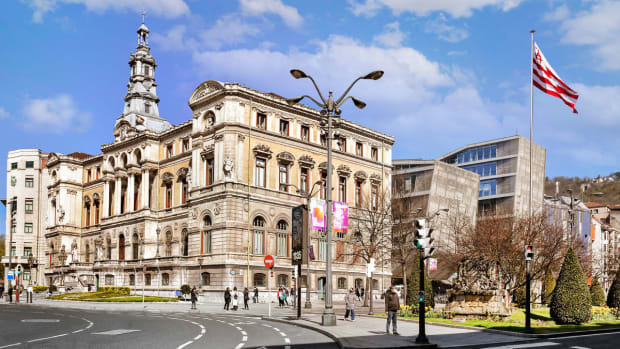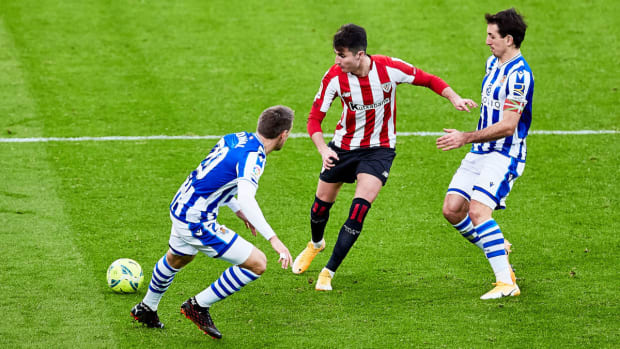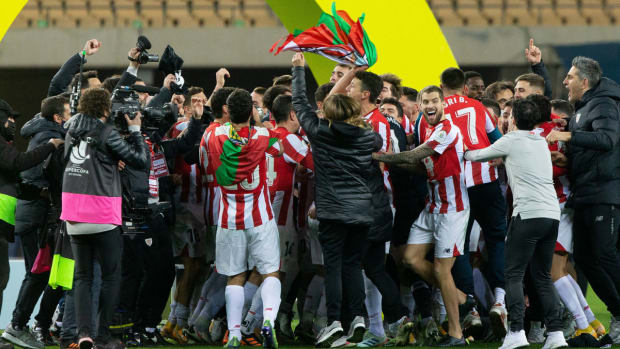Athletic Bilbao will play in two Copa del Rey finals in two weeks. It's an oddity of pandemic football and one happening to one of the world's most unique clubs.
Last week, the white-and-red city flag hanging high over Plaza Ernesto Erkoreka, which is just outside Bilbao’s city hall, was taken down. Bilbao has not been conquered. Instead, it is asserting itself, perhaps more so than at any point in nearly four decades.
This has never been a place that shied away from strutting its stuff—Bilbaínos often call their city “the center of the world.” But the opportunity this month to validate itself and draw attention to the power of its distinctive identity is unprecedented. And so the city flag was lowered, and the flag of Athletic Club, which is also white and red, was raised.
“From today onwards this is going to be the month of Athletic,” mayor Juan Mari Aburto said. “That's why we're going to have Athletic's flag flying in the city. It's the true symbol of our city. It's the one all Bilbaínos identify with. We have an historic opportunity: two Copa finals to keep making history. Two finals to demonstrate our pride in the city and Athletic.”
The buzz has been muted, of course, by the pandemic. But the air of city-wide anticipation remains unmistakeable. The club has encouraged fans to decorate their homes in red and white and Athletic’s classic crest, and to wear the club colors. It even distributed more than 8,000 bandanas to residents of local senior living facilities.

”You can sense there’s a great atmosphere,” Athletic forward Asier Villalibre said this week. “When you go outside, you see everything that’s going on. All the balconies … all the people encouraging you.”
Bilbao is ready. It’s been waiting for 12 months and for 37 years. La Gabarra, the modest blue barge that carries Athletic players down the city’s estuary when celebrating a major title, is docked and on the verge of its first run since 1984. Athletic won the Spanish double that year but, two Supercopa titles aside, it hasn’t claimed a significant honor since. Now it has a shot at two in two weeks. On Saturday at Seville’s Estadio de La Cartuja, it will contest the postponed 2020 Copa del Rey final against Basque rival Real Sociedad. Then on April 17, on the same field, Athletic will play mighty Barcelona in the 2021 Copa del Rey decider.
It’s significant that there are two high-profile cup finals in the same month. It’s significant that one club is playing in both. And it’s especially significant that that club is Athletic. To understand why, one must appreciate how much football has changed since 1984. It was relatively parochial then. Now it’s a global industry with its own economy, and it’s dominated by massive clubs fielding teams loaded with international stars. To understand why, one also must appreciate the power and cultural importance of the “bilbainada.”
A type of robust song originally performed by bar-hoppers in Bilbao, the bilbainada has evolved into a perspective, a calling, a worldview and a label attached to any event that embodies Bilbaínos’ bottomless belief in their own potential. It’s not meant to be disrespectful. Rather, the bilbainada symbolizes a self-aware but empowering feeling of pride and invincibility. It’s a success born out of cocky conviction.

When Inigo Montoya (and the Dread Pirate Roberts, who wasn’t Spanish but apparently had an instinctive appreciation for bilbainada) fought left-handed in The Princess Bride even though he didn’t have to, that was a bilbainada. When the Basque government offered to fund the construction of the Guggenheim Museum Bilbao in the overlooked city’s rundown port area, that was a bilbainada. In 1958, Spanish dictator Francisco Franco wanted the Copa del Rey final between European champion Real Madrid and Athletic played in the capital. Atlético Madrid’s stadium was selected as the “neutral” site. No, Athletic president Enrique Guzmán insisted. Let’s play it at the Bernabéu. Athletic won. That was a bilbainada.
Athletic Club is a living, breathing bilbainada, taking on all comers with one hand tied behind its back. Founded in 1898, when locals took a liking to the sport played by British sailors and dockworkers (the red-and-white striped jerseys were influenced by Southampton’s), Athletic adopted its Basques-only policy in 1911. Since then, the club has signed only players who were either born in the Basque Country or developed primarily by a club located therein. Comprising the four traditional Basque provinces in northern Spain as well as three in southwestern France (French players are a rarity at the club), the Basque Country is home to about 3.1 million people. Geographically, it’s around the size of New Jersey.
This is Athletic Club’s player pool. These are the resources upon which it must draw to challenge the likes of Barcelona and Real Madrid (Athletic’s closest analog, Chivas de Guadalajara, has an exponentially larger number of potential players—all Mexicans—and doesn’t face rivals loaded with world-class talent). That 1958 final is said to have been won by “11 villagers,” and those “villagers” and their descendants have been deemed to be sufficient. Athletic claimed eight league titles and 23 Copas del Rey before the soccer landscape changed forever, and it takes immense pride in the fact that it’s one of only four clubs in Europe’s big five leagues that’s never been relegated (Barcelona, Real Madrid and Inter Milan are the others).
The club, and thus the city, are defined by that steadfast self-belief. Athletic fans and administrators would sooner be relegated than abandon their principals. Any match contested with locals, with neighbors, is worth more than a Champions League final contested with foreigners.
“Football is played all over the world,” Athletic president Aitor Elizegi told Sports Illustrated. “But when it arrived in Bilbao, it was played better than ever before.”
That’s the spirit of bilbainada.
The importance of community and heritage is a big reason why the 2020 final is being played on Saturday. Athletic and Real Sociedad, which is from San Sebastian, are separated by about 65 miles. They’ve never met in the Copa del Rey final, and both clubs desperately wanted the game staged in front of fans. Spain’s federation, the RFEF, agreed to postpone the match as long as possible, with the 2021 final serving as the deadline. But time ran out. La Cartuja will be empty this month.
“We have a unique project in world football and we know that we have to protect it,” Elizegi explained. “The most important part of our philosophy and of the club is our fans and our club members. Instead of playing without them, we’ll do whatever’s possible to make sure we can play with them. Athletic turned down the chance to play in Europe [by postponing the 2020 final that provided a ticket to the Europa League], and I think in the end, destiny is going to reward us with a very special 2021.”

These cup runs do have a feel of destiny about them. Athletic finished 11th in La Liga last season but advanced to the 2020 Copa del Rey showpiece thanks to two penalty shootout triumphs, a 93rd-minute own goal by Barcelona’s Sergio Busquets in the quarterfinals and then an away-goals win over Granada in the semis. Defender Yuri Berchiche scored in the 81st minute of the second leg to send Athletic through.
Now ninth in La Liga, Athletic’s cup form continued into 2021 as it waited to play the 2020 final. In early January, Marcelino García Toral replaced Gaizka Garitano as head coach (Athletic managers don’t have to be Basque). The team was re-energized. A 91st-minute goal by Unai Núñez dispatched Ibiza in the round of 32. Athletic then came from a goal down to beat third-tier Alcoyano, before surviving a shootout against Real Betis in the quarters. A 112th-minute goal by Álex Berenguer, the club’s only major offseason acquisition, then lifted Athletic over Levante in the second leg of the semis on March 4.
Athletic calls itself the “King of Cups” thanks to its success in the competition before Barcelona eclipsed its record number of wins in the late 1990s. And barring a miracle, cup runs are where the club is likely to find its success going forward (Athletic also advanced to, but lost, the UEFA Cup/Europa League final in 1977 and 2012).
“We have to understand that with our philosophy, it’s impossible to compete with the 10 biggest teams in Europe. It’s simply impossible,” said Athletic sporting director Rafael Alkorta, who was a young player at the club back in the double days of 1984. “It’s more difficult, honestly, to win a long championship, to win a league, where you have to play 38-40 matches over a season. But obviously in competitions like the Copa del Rey, where you have knockout ties, we can beat anyone.

“We have absolute belief that we can beat any other team at any other moment,” Alkorta continued. “The fitness and the mentality—they’re the reasons why we’ve been able to get through these types of matches with extra time, penalty shootouts, etc.”
Mentality plays a massive role at Athletic. With roots planted firmly in the spirit of bilbainada, it’s based on the idea that 11 villagers will fight that much harder to defend their homes and ideals. Every young player growing up in the province of Biscay, and perhaps the whole Basque Country, dreams of playing for Athletic. That competition for places creates a developmental crucible unlike almost any in the world. And because the club doesn’t spend massive sums on transfers, it’s able to plow more revenue back into Lezama, its acclaimed academy, and into retaining current players.
“Success for a sporting director at a club like this, which is a unique club in the world, is to have a great academy,” Alkorta told Sports Illustrated. “To have the best coaches, the best material, the best equipment, so that we can work to the best of our abilities with young kids when they come to the academy. We can’t go out and sign the best players in the world. We have to create our own superstars.”
A December 2019 study by the CIES Football Observatory examined the 42 clubs that were ever-present in Europe’s big five leagues from 2010 through 2019 and found that on the average team, 17.9% of all minutes were played by academy products. At Athletic, that figure was an astounding 61.3%.
Not only are players developed at Athletic, they often stay. The feeling of representing Bilbao and the Basque Country doesn’t get old. As a result, the club is saddled with less first-team turnover and can build greater chemistry and continuity. The same CIES study found that Athletic used the smallest number of players among the 42 clubs during the 2010s—77, compared to the average of 117.
Alkorta, a Bilbao native who represented Spain at the 1990, 1994 and 1998 World Cups, left Athletic for Real Madrid in 1993 and then returned four years later.
“When you play for a club that’s from your land, a club that you have connections to—family connections to—you’re going to feel it more than perhaps another player who’s form somewhere else but ends up playing for Real Madrid or Bayern Munich or Barcelona,” he said. “It gives you more strength.”

On the 26-man squad that will try to win two Copas in two weeks, 18 were promoted either from Lezama or as young players from the club’s reserve side. They will have dreamed of lifting a trophy in Athletic’s red and white for years. And that dream very well could be one that has been passed down for generations. The transcendent nature of that ambition is what has kept club captain Iker Muniain, for example, in Bilbao since he joined the academy as a 12-year-old in 2005. He has made more than 470 professional appearances for Athletic, including the 2012 Copa del Rey final loss to Barcelona and the 2012 Europa League final loss to Atlético Madrid.
“When someone is very clear about where their future lies and where they want to be, and it’s as clear as it’s always been for me, logically it’s so one day they can have these amazing moments,” he said during the buildup to Saturday’s final. “I’ve imagined it many times. I’m human—a person. And you think about it and you imagine it. But beyond that, my experience tells me that I need to be calm. I can’t go crazy over it, and that the fact we haven’t lifted the trophy in so long doesn’t mean we’re guaranteed to win.”
Guaranteed—no. But does Athletic expect to win? Absolutely. It’s come this far, and the chance to capture a unique double—against a local rival and then Barcelona, no less—while affirming that its approach can succeed in a modern football environment is too enticing a prospect to be wasted. History means so much at Athletic. A conversation with Elizegi not only touches on 1958 and 1911, but on the fact that the people now known as Basques first settled their land some 20,000 years ago. It’s all connected. And all now associated with the club, from the mayor to the players, know they’re on the cusp of adding an unforgettable chapter to that story. This month, and the possibility of lifting two Copas del Rey in two weeks, represents an opportunity to honor a century-long commitment while staking a claim to part of football’s future, all at once.
“It’s more difficult [to win at Athletic], and in the end it will strengthen our philosophy and it will help it keep going. It’s important for young kids to know that playing without foreign players, you can still win things,” Alkorta said.
The motivation to beat Real Sociedad will be obvious to any soccer fan. There’s local bragging rights and turf at stake (La Real signs foreign players but still competes for talent locally), not to mention a title. Despite its more modest history, Real Sociedad has won a Copa del Rey more recently than Athletic, back in 1987. It also finished higher in La Liga last season.

As for Barcelona, that represents the chance at a bilbainada. Each of Athletic’s last three appearances in the Copa final ended with losses to the Blaugrana, and Athletic’s 3-2 victory in January’s Supercopa decider wiped away just a small portion of that sting. Taking two trophies from Barcelona in one season, however—that would be remembered forever.
“The truth is that in 2021, Athletic is a bilbainada,” Elizegi said. “To win against a huge team like Barcelona is a bilbainada, and pretty much even to believe that we can keep winning is a bilbainada. That fact that we believe we can do it—we believe that we can win and we believe that we can keep on winning in the future is a bilbainada.”
Anyone affiliated with Athletic will tell you that they’re convinced they do things the right way. But that doesn’t change the fact that they’ve waited 37 years to celebrate a bit of confirmation.
“I think we’re on the path to something very special. We have an opportunity to reiterate in the 21st century that our model can be successful. We’re going to show the world, again, that Athletic can win titles and be successful on a massive level,” Elizegi continued.
“We’re the last artisans of this sport. We’re surrounded by franchises and industry. It’s a model that needs to be reinforced with triumphs and victories. … It’s like a jumping-off point going into the future.”